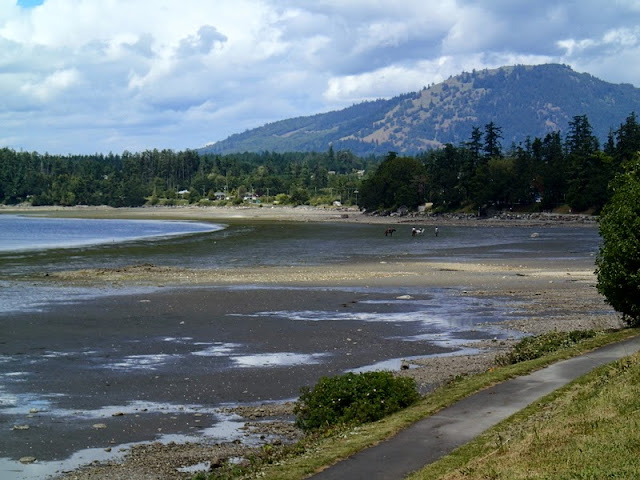 |
| Wreckage of a 1942 crash recently found on Vancouver Island. |
The 70-year-old mystery of four airmen lost during a World War II training flight has finally been solved after a chance discovery by loggers on Vancouver Island.
Three British and one Canadian took off on a training exercise from Patricia Bay on Oct. 30, 1942. They were members of the Royal Canadian Air Force 32 Operational Training Unit. They departed from the air force base at Patricia Bay in Sidney.
When they didn't return, a search failed to find their downed Avro Anson L7056. The plane was classified as "Missing" on 1 December 1942. That is how its status has remained - until now.
Last October, a logging crew from Teal-Jones Cedar Products spotted the wreck and notified authorities. A recovery effort was launched by the Department of National Defence and the B.C. Coroners Service.
“They came across some debris in the forest, and they figured it was a plane crash,” said Michael Pegg of Teal-Jones.
“There were wheels, the engine of the plane, mangled plane parts. There was a boot, shoes and a jacket.”
The coroner’s office said the plane crashed on a remote mountainside near Port Renfrew on the Island’s southwest coast, just 50 kilometers west of where the twin-engine propeller plane took off. The site is six miles northwest of Port Renfrew, Vancouver Island. It lies in a steep, wooded hillside near Mesachie Lake.
Weather was bad this winter in Vancouver, just like everywhere else in North America. Finally, in early May, crews were able to reach the site.
“The primary focus of the operation was to recover any human remains and artifacts, as well as identify and remove potential physical and/or environmental hazards,” said DND spokeswoman Johanna Quinney in a release Friday.
Royal Canadian Air Force Sgt. William Baird of Calgary; Royal Air Force Pilot Officers Charles George Fox and Anthony William Lawrence; and Sgt. Robert Ernest Luckock had been listed as missing and presumed dead. The B.C. Coroners Service now has identified and removed their remains from the site.
The DND and Canadian Air Force worked with the Commonwealth War Graves Commission, officials in the U.K. and relatives of the airmen to organize a formal interment ceremony. They were buried at Royal Oak Burial Park in Victoria on 10 November 2014.
“This recovery, and subsequent burial, will provide closure to the families and give these fallen service members the dignity and respect they deserve,” said National Defence Minister Rob Nicholson in a statement.
“No matter how much time passes, doing the right thing for our people and for their families is an Air Force priority,” said RCAF Commander Lieut.-Gen. Yvan Blondin.
Pegg said it’s been a fascinating story for him and his forestry crew. One of the lost airmen still has siblings who now are in their 90s.
“It touches your heart when you realize there are these families that have been out there not knowing what has happened to their siblings for all these years,” he said.
“Hopefully this will be able to provide some closure to them.”
More than 100 aircrews died while flying out of Patricia Bay during the Second World War.
The crash site remained closed while the military wrapped up environmental testing.
2020
Three British and one Canadian took off on a training exercise from Patricia Bay on Oct. 30, 1942. They were members of the Royal Canadian Air Force 32 Operational Training Unit. They departed from the air force base at Patricia Bay in Sidney.
When they didn't return, a search failed to find their downed Avro Anson L7056. The plane was classified as "Missing" on 1 December 1942. That is how its status has remained - until now.
 |
| Avro Anson trainer. |
“They came across some debris in the forest, and they figured it was a plane crash,” said Michael Pegg of Teal-Jones.
“There were wheels, the engine of the plane, mangled plane parts. There was a boot, shoes and a jacket.”
 |
| Avro Anson period photo. |
 |
| Amazingly, the remains sat unfound for 72 years not far from Seattle. |
“The primary focus of the operation was to recover any human remains and artifacts, as well as identify and remove potential physical and/or environmental hazards,” said DND spokeswoman Johanna Quinney in a release Friday.
Royal Canadian Air Force Sgt. William Baird of Calgary; Royal Air Force Pilot Officers Charles George Fox and Anthony William Lawrence; and Sgt. Robert Ernest Luckock had been listed as missing and presumed dead. The B.C. Coroners Service now has identified and removed their remains from the site.
 |
| Patricia Bay. |
“This recovery, and subsequent burial, will provide closure to the families and give these fallen service members the dignity and respect they deserve,” said National Defence Minister Rob Nicholson in a statement.
“No matter how much time passes, doing the right thing for our people and for their families is an Air Force priority,” said RCAF Commander Lieut.-Gen. Yvan Blondin.
Pegg said it’s been a fascinating story for him and his forestry crew. One of the lost airmen still has siblings who now are in their 90s.
“It touches your heart when you realize there are these families that have been out there not knowing what has happened to their siblings for all these years,” he said.
“Hopefully this will be able to provide some closure to them.”
More than 100 aircrews died while flying out of Patricia Bay during the Second World War.
The crash site remained closed while the military wrapped up environmental testing.
2020

No comments:
Post a Comment